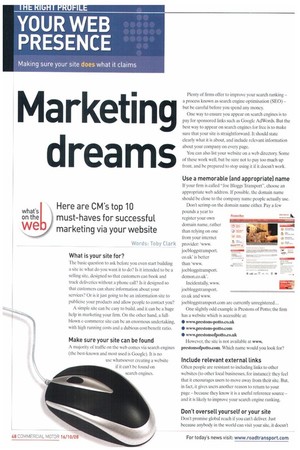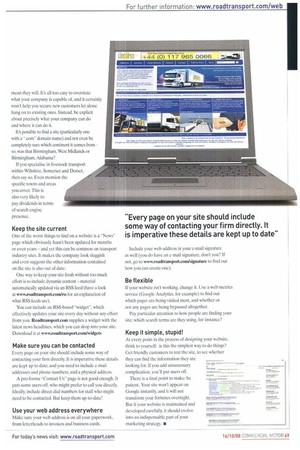Marketing dreams
Page 48

Page 49

If you've noticed an error in this article please click here to report it so we can fix it.
Here are CM's top 10 must-haves for successful marketing via your website
Words: Toby Clark What is your site for?
The basic question to ask before you even start building a site is: what do you want it to do? Is it intended to be a selling site, designed so that customers can book and track deliveries without a phone call? Is it designed so that customers can share information about your services? Or is it just going to be an information site to publicise your products and allow people to contact you?
A simple site can be easy to build, and it can be a huge help in marketing your firm. On the other hand, a fullblown e-commerce site can be an enormous undertaking, with high running costs and a dubious cost/benefit ratio.
Make sure your site can be found
A majority of traffic on the web comes via search engines (the best-known and most used is Google). It is no use whatsoever creating a website if it can't be found on search engines. Plenty of firms offer to improve your search ranking a process known as search engine optimisation (SEO) but be careful before you spend any money.
One way to ensure you appear on search engines is to pay for sponsored links such as Google Ad Words. But the best way to appear on search engines for free is to make sure that your site is straightforward. It should state clearly what it is about, and include relevant information about your company on every page.
You can also list your website on a web directory. Some of these work well, but be sure not to pay too much up front, and be prepared to stop using it if it doesn't work.
Use a memorable (and appropriate) name
If your firm is called "Joe Bloggs Transport", choose an appropriate web address. If possible, the domain name should be close to the company name people actually use.
Don't scrimp on the domain name either. Pay a few pounds a year to register your own
domain name, rather A— R,M•ittihre than relying on one 4
from your internet provider: `www. joebloggstransport. co.uk' is better than `www. joebloggstransport. demon.co.uk'.
Incidentally, www. joebloggstransport. co.uk and www. joebloggstransport.com are currently unregistered...
One slightly odd example is Prestons of Potto; the firm has a website which is accessible at: • www.prestons-pottn.en.uk • www.prestons-potto.com • www.prestonsofpotto.co.uk However, the site is not available at www. prestonsofpotto.com. Which name would you look for?
Include relevant external links
Often people are resistant to including links to other websites (to other local businesses, for instance): they feel that it encourages users to move away from their site. But, in fact, it gives users another reason to return to your page because they know it is a useful reference source and it is likely to improve your search engine ranking.
Don't oversell yourself or your site
Don't promise global reach if you can't deliver. Just because anybody in the world can visit your site, it doesn't mean they will. It's all too easy to overstate what your company is capable of, and it certainly won't help you secure new customers let alone hang on to existing ones. Instead, he explicit about precisely what your company can do and where it can do it.
It's possible to find a site (particularly one with a -.corn" domain name) and not even he completely sure which continent it comes from so, was that Birmingham, West Midlands or Birmingham, Alabama?
If you specialise in livestock transport within Wiltshire, Somerset and Dorset, then say so. Even mention the specific towns and areas you cover. This is also very likely to pay dividends in terms of search engine presence.
Keep the site current
One of the worst things to find on a website is a "News" page which obviously hasn't been updated for months or even years and yet this can be common on transport industry sites. It makes the company look sluggish and even suggests the other information contained on the site is also out of date.
One way to keep your site fresh without too much effort is to include dynamic content -material automatically updated via an RSS feed (have a look at www.roadtransportcomirss for an explanation of what RSS feeds are).
You can include an RSS-based "widget", which effectively updates your site every day without any effort from you. Roadtransportcom supplies a widget with the latest news headlines, which you can drop into your site. Download it at www.roadtransport.cornhvidgets
Make sure you can be contacted
Every page on your site should include some way of contacting your firm directly. It is imperative these details are kept up to date; and you need to include e-mail addresses and phone numbers, and a physical address.
A pro-forma "Contact Us" page is not good enough. It puts some users off, who might prefer to call you directly. Ideally, include direct-dial numbers for staff who might need to he. contacted. But keep them up-to-date!
Use your web address everywhere Make sure your web address is on all your paperwork, from letterheads to invoices and business cards. Include your web address in your e-mail signature as well (you do have an e-mail signature, don't you? If not, go to www.roadtransport.comisignature to find out how you can create one).
Be flexible
If your website isn't working, change it. Use a web metrics service (Google A nalytics, for example) to find out which pages are being visited most, and whether or not any pages are being bypassed altogether.
Pay particular attention to how people are finding your site; which search terms are they using, for instance?
Keep it simple, stupid!
At every point in the process of designing your website, think to yourself: is this the simplest way to do things? Get friendly customers to test the site, to see whether they can find the information they are looking for. If you add unnecessary complication, you'll put users off.
There is a final point to make: be patient. Your site won't appear on Google instantly, and it will not transform your fortunes overnight. But if your website is maintained and developed carefully, it should evolve into an indispensable part of your marketing strategy. ill
















































































































































































